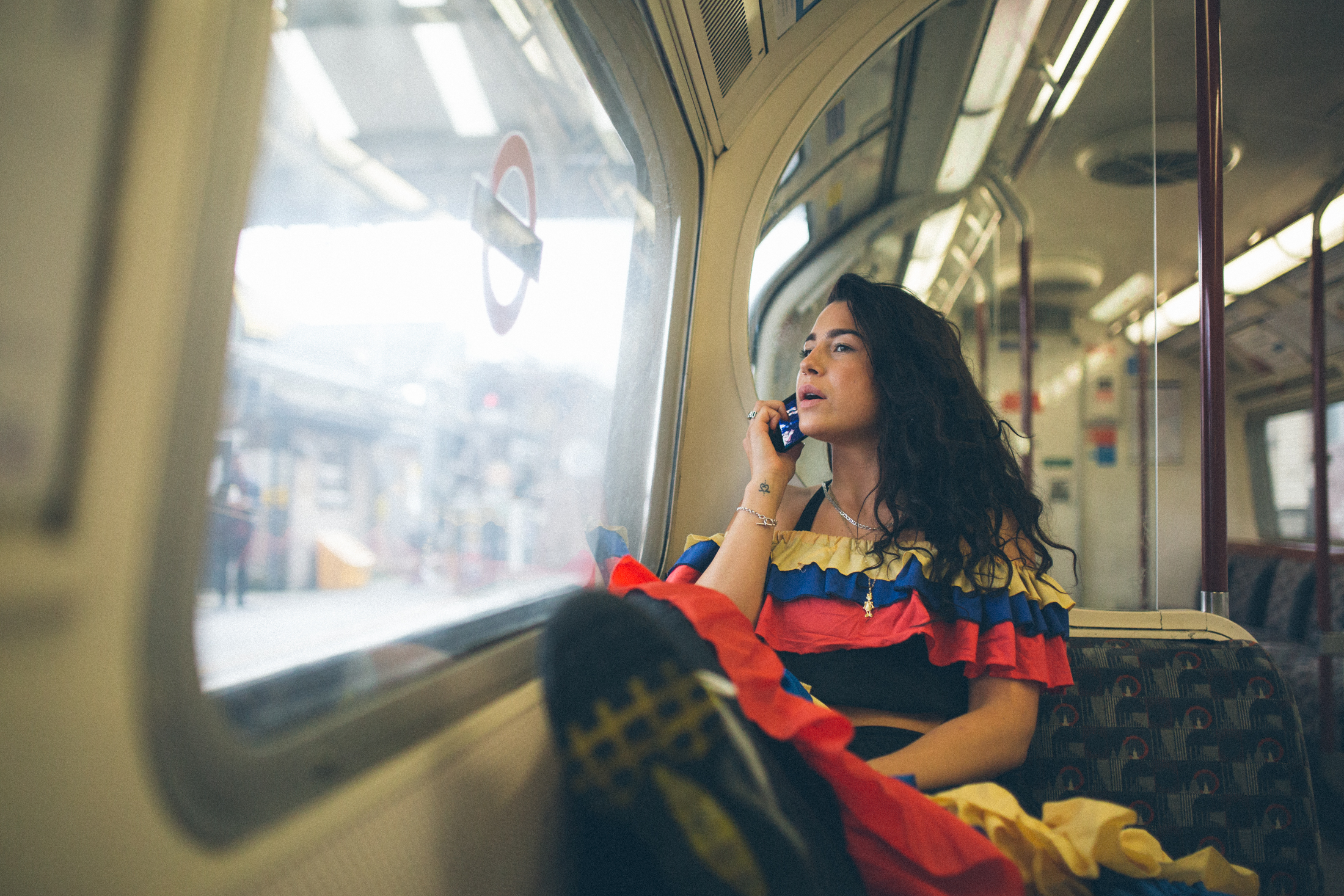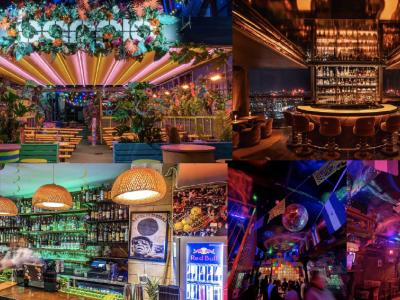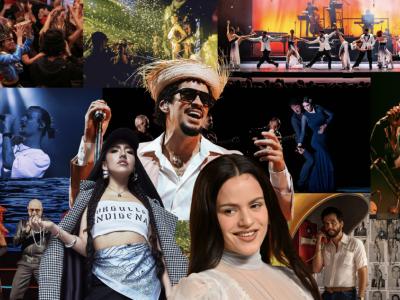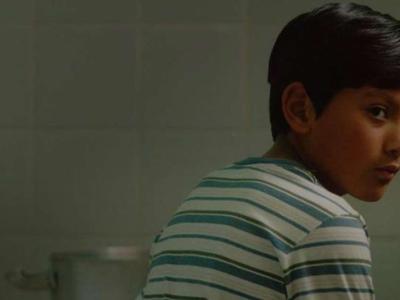"I know many of you have come here to find your dreams." The words flow from the warm signature smile and glowing cheeks of the pink-haired mermaid goddess known as la bichota, as her confident Colombian hips straddle the stage in a sparkling leotard. "Well, I'm here to bring you a little piece of home." The roar of 20,000 Latinos erupts in a wave of emotion. At the second night of Karol G’s concert in The 02, little did the audience know that it was making history. Never before had a Latin artist sold out two nights at London's largest arena. And she happened to be Colombian.
More poignantly, the 40,000 majority Colombians delighting in Karol G's recognition of their reality, made a real-life mockery of the UK government's official number of Colombians living in the UK (27,848). The underestimation itself signals an under-recognised community, made up not only of many undocumented migrants, living and working invisibly, but legal, professional high-achievers who are not recognised because on UK government forms even ‘Latin American’ is not an option given. Officially, they find themselves having to tick the box marked simply ‘Other.’
What is real is that the UK has the world’s third biggest Colombian diaspora, after the US and Spain, and that it constitutes the UK's largest Spanish-speaking community. More importantly, as these two record-breaking shows exemplify, Colombians are a massive contributor to the UK economy, society and culture. They are cleaners, professors, actors, artists, engineers, entrepreneurs and much more. They make up one of the most hardworking, charismatic, creative and entrepreneurial communities in the UK. And yes, when they are not working, Colombians still find the time to party. And boy they do it well.
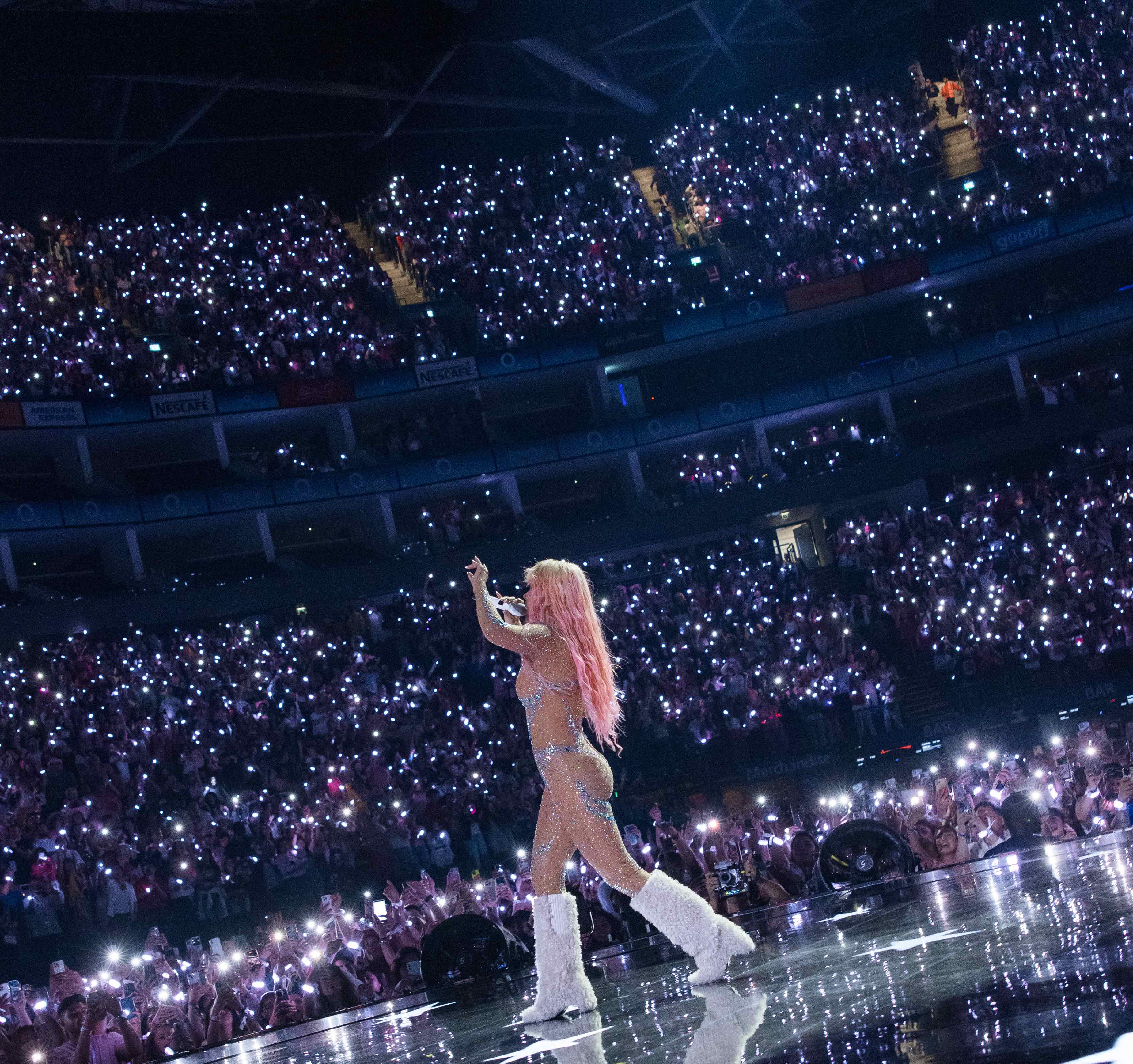
How did this Massive Community Come to Be?
Throughout the 1970s, thousands of Latin American refugees arrived, fleeing dictatorships from Argentina, Chile, Brazil and then Central America. The Immigration Act of 1971 had made it possible for Latin Americans to be granted work permits in the UK. Amongst those taking up low paid jobs were academics, doctors, lawyers and other highly-skilled professionals who had to start from scratch.
"The first wave of Colombian migration was linked with the failing coffee harvests in 1970-80s," says Cathy McIlwaine, Professor of Geography at King’s College London, whose key publications ‘No Longer Invisible’ (2011) and ‘Towards Visibility’ (2016), were the first to quantify and qualify the Latin American population in London. By the 1980s, she adds, there was a mass exodus of Colombians, who started fleeing the terror of the country's civil war between left wing guerrilla groups, government forces and right-wing paramilitary groups.
"Colombians vigorously seized the opportunities offered by the UK," agrees Dr Patria Roman Velazquez, Senior Lecturer at King’s College London and Founder of activist group Latin Elephant.
"My grandfather was a passenger on one of the first planes from Colombia in the 1970s," says Jacqueline, a third-generation Colombian and founder of clothing brand LatinaStyled. "He left behind his children, took up the invitation to come to the UK on a work permit that aimed to bring in workers for hospitality. They were promised visas, jobs, and somewhere to stay, however, the reality was that there was neither a job nor a place to stay. They came here with dreams, which were very quickly shattered.”
Most Colombian immigrants began working in positions where speaking English wasn’t required - restaurant kitchens, hospitals and in cleaning jobs. "They worked long hours for insufficient pay and still do," says Kari Jaldin, Latin American Community Organiser at Citizens UK. "Helping them access the Living Wage Campaign is still one of the main priorities in my work." Over the decades, having absorbed their work ethic, children and grandchildren such as Jacqueline, whose LatinaStyled became the first Latina-run brand to have a pop-up on Oxford Street, are testament to the sacrifices of these pioneers.
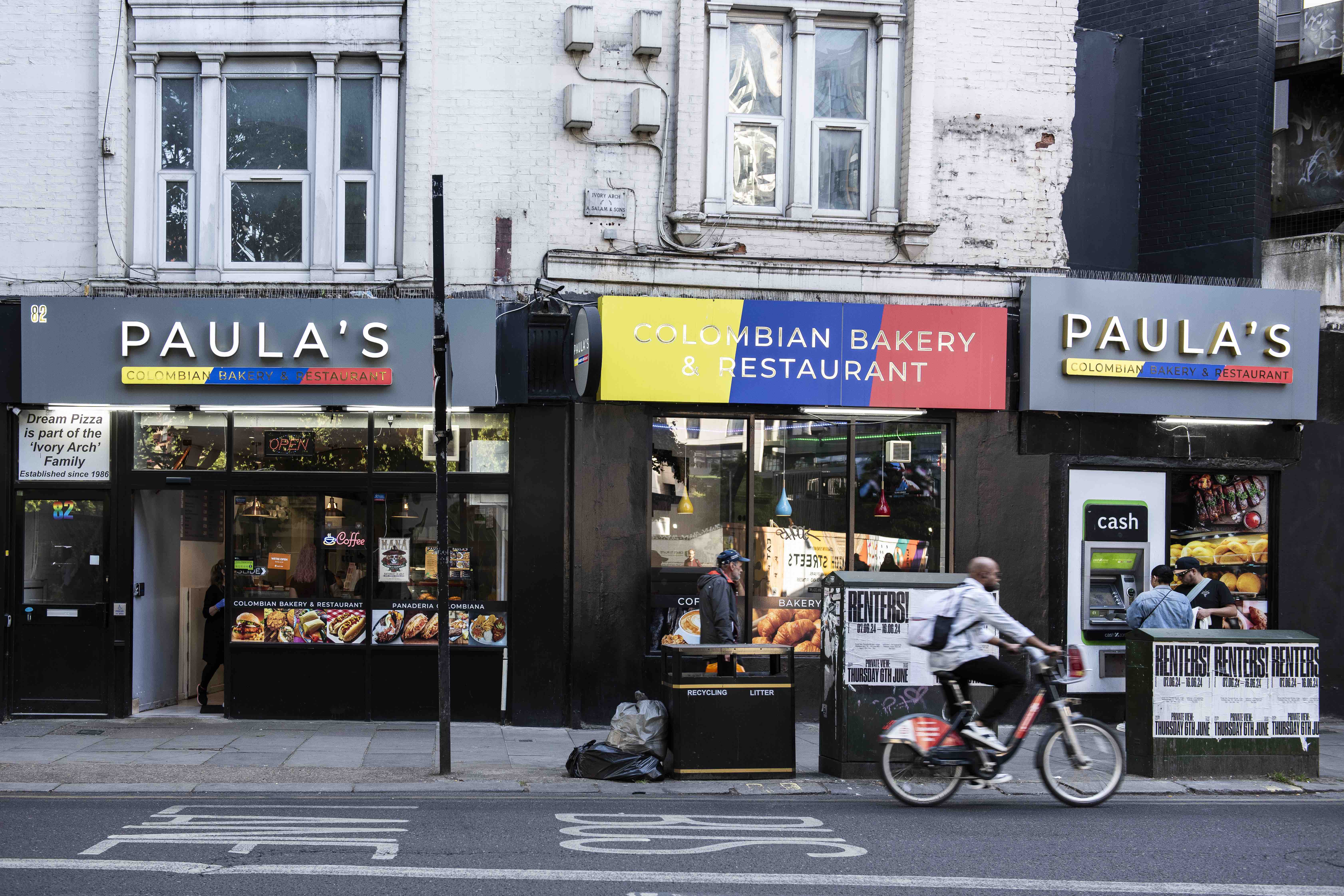
“It had to be done”: The Grafting Mindset
In the noughties a second generation of Colombians arrived in the UK. Many had been living in Italy, Portugal or Spain where, between 2001 and 2005, the Colombian population tripled. But when the financial crisis of 2008 hit, they began looking for fairer financial pastures in Europe.
Gustavo Sánchez, owner of much-loved Colombian bakery and café Juanchito’s in New Cross' Placita Mall, was one of these “onward Latin Americans,'' as they are referred to. In 2000 Gustavo parted with his four children, leaving them in Bogotá, where he had learned to perfect the texture of a pan de bono from his father, an experienced panadero. Choosing to move to Spain first, Gustavo settled well, setting up a café and bakery business. “As a Colombian in Spain, it was very easy," he says. "Within 3 years, I had secured my papers.”
After the crisis hit Spain, he couldn't make ends meet and eventually left for the UK. With his EU passport, Gustavo was able to move to London and secured a job cleaning offices in the West End. Thinking back to those tiring shifts, which started at four in the morning, Gustavo says simply: “it had to be done.”
As I compliment the smooth taste of the Colombian coffee he has brewed for us, Gustavo remembers the disbelief at how bad the coffee was in the big café chains when he arrived in London. As he pushed through the gruelling cleaning work, he dreamed of setting up his own coffee stall, which he eventually did and where we sit sipping a cafecito while soaking in the very Colombian atmosphere. Thanks to making the move in the pre-Brexit period, Gustavo was granted leave to remain in the UK, which he now calls home. "Even the rain reminds me of Bogotá," He laughs, although admitting. “I am 100% proud of being Colombian…it’s my land.”
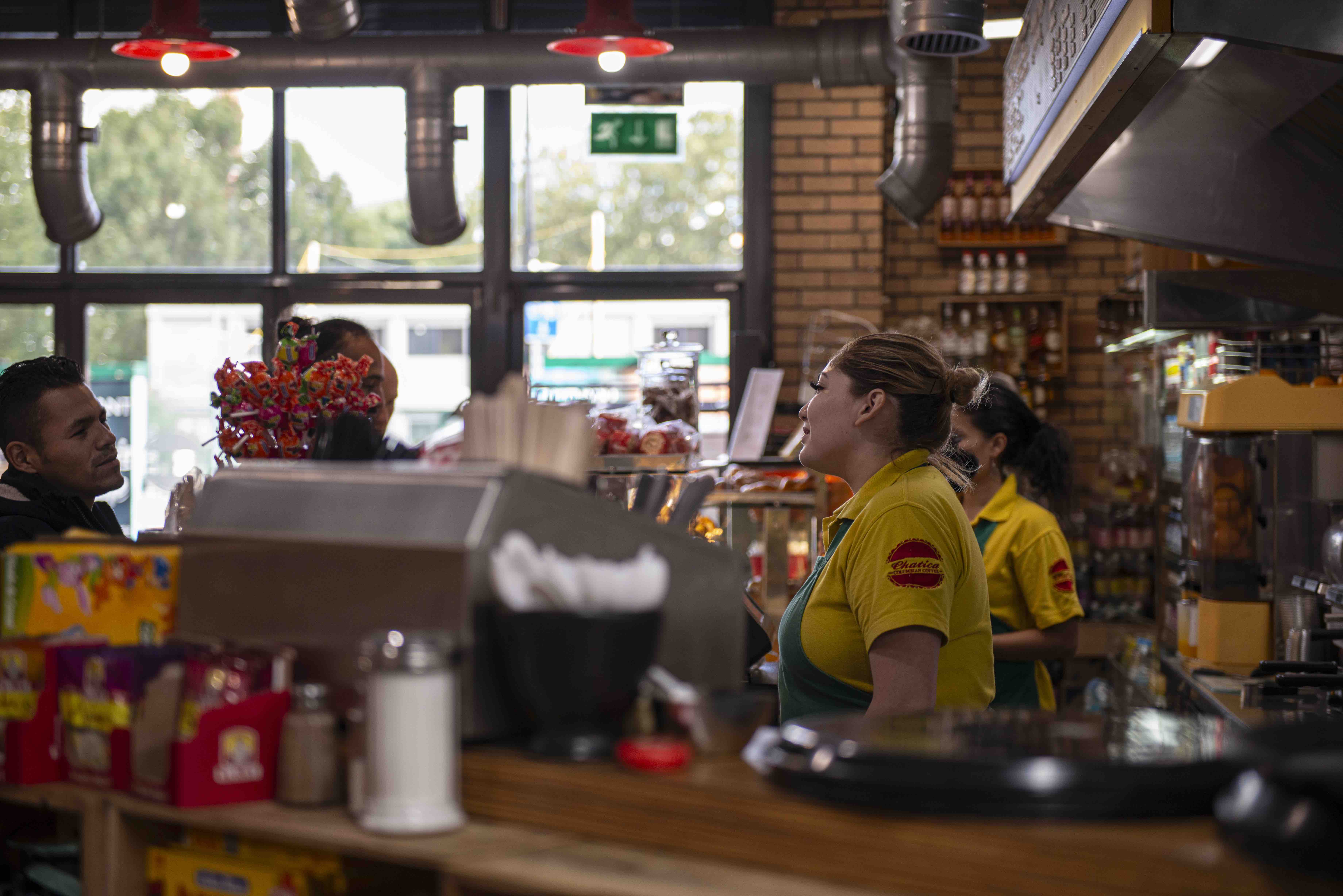
The “Ecosystem” of Being British-Colombian
For those who are born here, the bi-cultural experience can be quite complex. British-Colombian artist, Sachellys, mentions that most of the British-Latinos here go through “some sort of identity crisis”. Jaqueline recalls the experience of her first day at a predominantly white primary school, where she cried because she wasn't used to speaking so much English and felt out of place. It was at secondary school, she says, where she found a “melting pot of cultures,” and finally began to understand her hybrid identity. In her early teens, she began going to Colombian parties, such as Baby Chanéy, organised by Colombian entrepreneur Edwin Serna, where she made connections with other second-generation Colombians. Back then, MSN was also a great way for Colombians to connect across the city.
Edwin, who became known "Mr Colombia" arrived in the UK came here at 17 years old in 1991 and soon became one of the biggest references for the community through his salsa parties, for both adults and teens. "Every Colombian knew about his salsa parties," says Maira Cardenas, now in her 50s who for years attended Edwin's weekly Salsa City and El Peñol in Brixton. "Before the days of reggaeton, salsa was what unified the community, it was in salsa clubs where identities were forged, and Colombian salsa events were the first catalyst for social integration. They were like being in Cali, but right here in London"
After a night rumbeando, partygoers descend on Clapham Common for the feisty football matches of the Latin American leagues, where players show their Latin skills and flair, and the new generation are taught the 'Latino way'. Edwin fondly recalls grabbing an empanada, arepa, or frijoles con chicharrón brought by parents after a match."These moments helped the community get to know each other, hear about job vacancies, and even find accommodation." It's no wonder that when Colombia played Spain recently in London, despite being the “visiting” team, it felt like the Colombian team was playing at home.
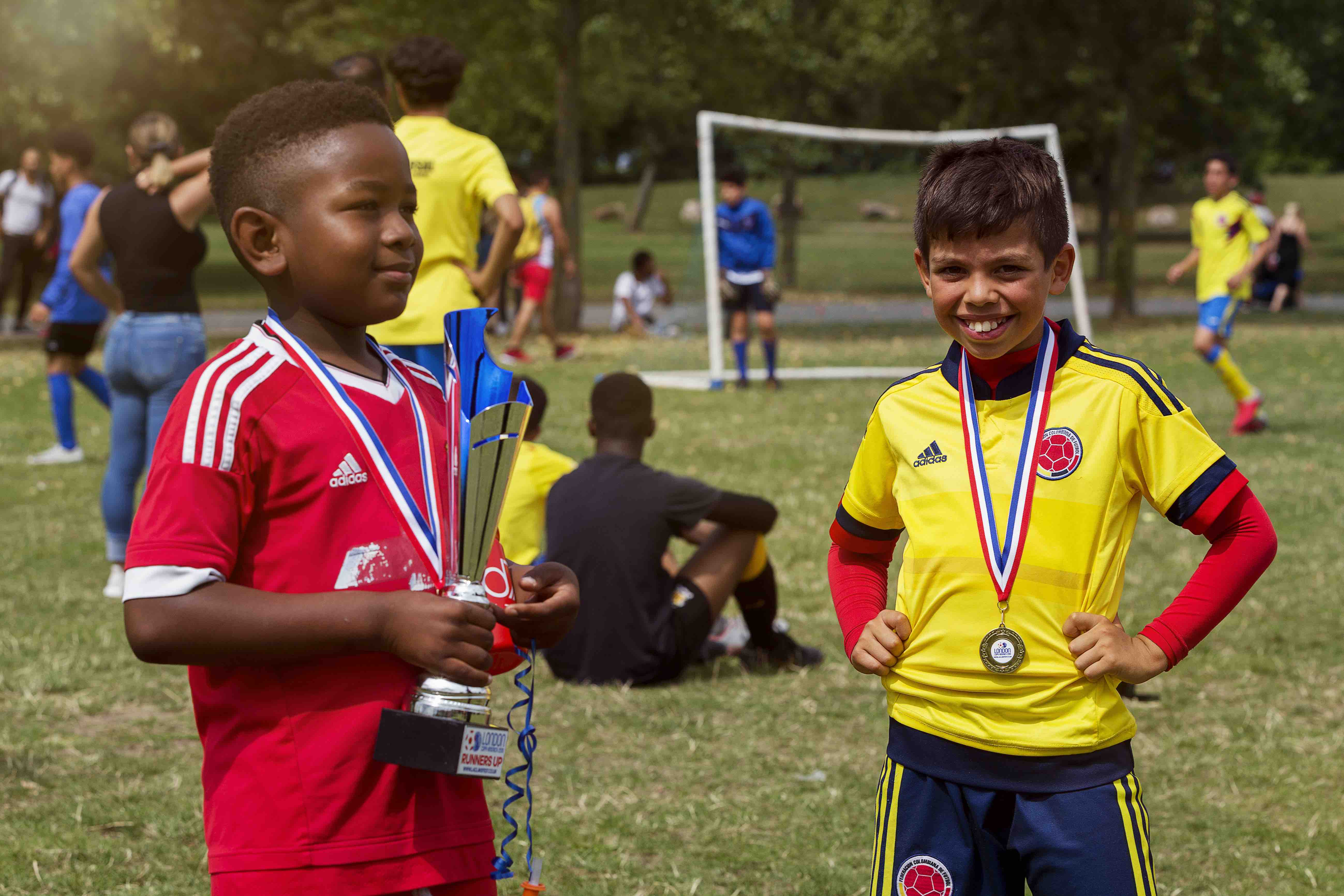
Away from dance floors and football pitches, the more pious found connection and community through the Catholic and Evangelical churches, or Iglesias de Dios. Father Carlos at the Latin American Chaplaincy of London, whose weekly mass has been bringing Latin Americans together since 2000, says: "Out of the Latin American population, most of my churchgoers are Colombian. They have a great identity for their country and their Catholic faith. It is a big part of their heritage and lives.”
“There’s a whole ecosystem that Colombians have built, in terms of civil society, through church, the arts, cultural centres, restaurants and commercial units,” adds Cathy McIlwaine. "Despite the challenges, Colombians have been very successful." In addition to these enterprises, Colombians have been key in the formation of organisations, projects, charities, foundations and activist groups that have given support to each other and the wider Latin American population.
Examples include Latin American House, now consisting of a bilingual nursery, a Spanish Saturday school, and drop-in advice centres, or the Latin American Women’s Rights Service (LAWRS), which help and house women fleeing domestic abuse. Another, Empoderando Familias, helps Spanish-speaking parents support their children’s education, to narrow the gaps in progressing to Higher Education. Other organisations such as IRMO, have been instrumental in supporting immigrants, with many now legendary Colombians, such as the award-winning human rights lawyer Laura Villegas, at the helm, helping Londoners from all over Latin America access their rights.
“Colombians have laid the ground for these organisations," says Kari Jaldin from Citizens UK. "Many of the Spanish-speaking lawyers who help the wider community are Colombian. They have opened the doors for inclusion for the rest of the community.”
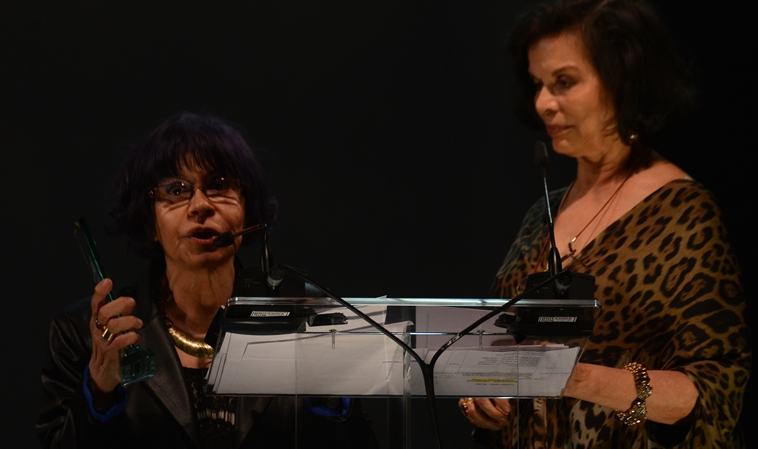
Most famously, Colombians have also led the struggle for better pay and working conditions, particularly in the cleaning industry, exposing shameful pay practices at the UK's highest institutions, including the Houses of Parliament and University of London. They joke that coming from a country where being a community activist can get you killed, fighting for rights in London is happy days! Nevertheless, the struggle to become visible has encountered formidable opponents, and perhaps the most important activism has been around saving the community's own cherished hubs from the threat of gentrification and property development.
Elephant and Castle, with over 80 small inter-independent Latin American businesses, 72% owned by Colombians, was for many years considered the heart of this ecosystem, while north of the river, Seven Sisters Indoor Market, also known as Latin Village or Pueblito Paisa was so full of Latin businesses, from travel agents to hairdressers, that Seven Sisters station came to be known as Seven Chismes. As developers threatened to remove the community from these commercial areas, two grassroots organisations, Save Latin Village and Latin Elephant stood in their way...
Highlighting the struggle of what she called “the heart of the Colombian community...a sea of yellow, blue and red on football days,” Patria Roman founded Latin Elephant and proposed a ‘Latin Quarter’ model comparable to Chinatown, to formally recognise the business cluster around Elephant and Castle as a ‘Latin Boulevard,’ attracting visitors to the area and supporting economic development.
Sadly, Elephant and Castle’s much-loved shopping centre was demolished in early 2021. However, because of Latin Elephant's amazing work in getting widespread media coverage, public and institutional support, it sealed the deal on a relocation fund for 60% of traders, most of whom were Colombian. Meanwhile Save Latin Village’s campaign was so relentless that after 10 years trying to remove the community, the developer Granger pulled out. As of August 2023, Seven Sisters still has 160 market employees, mainly Colombian.
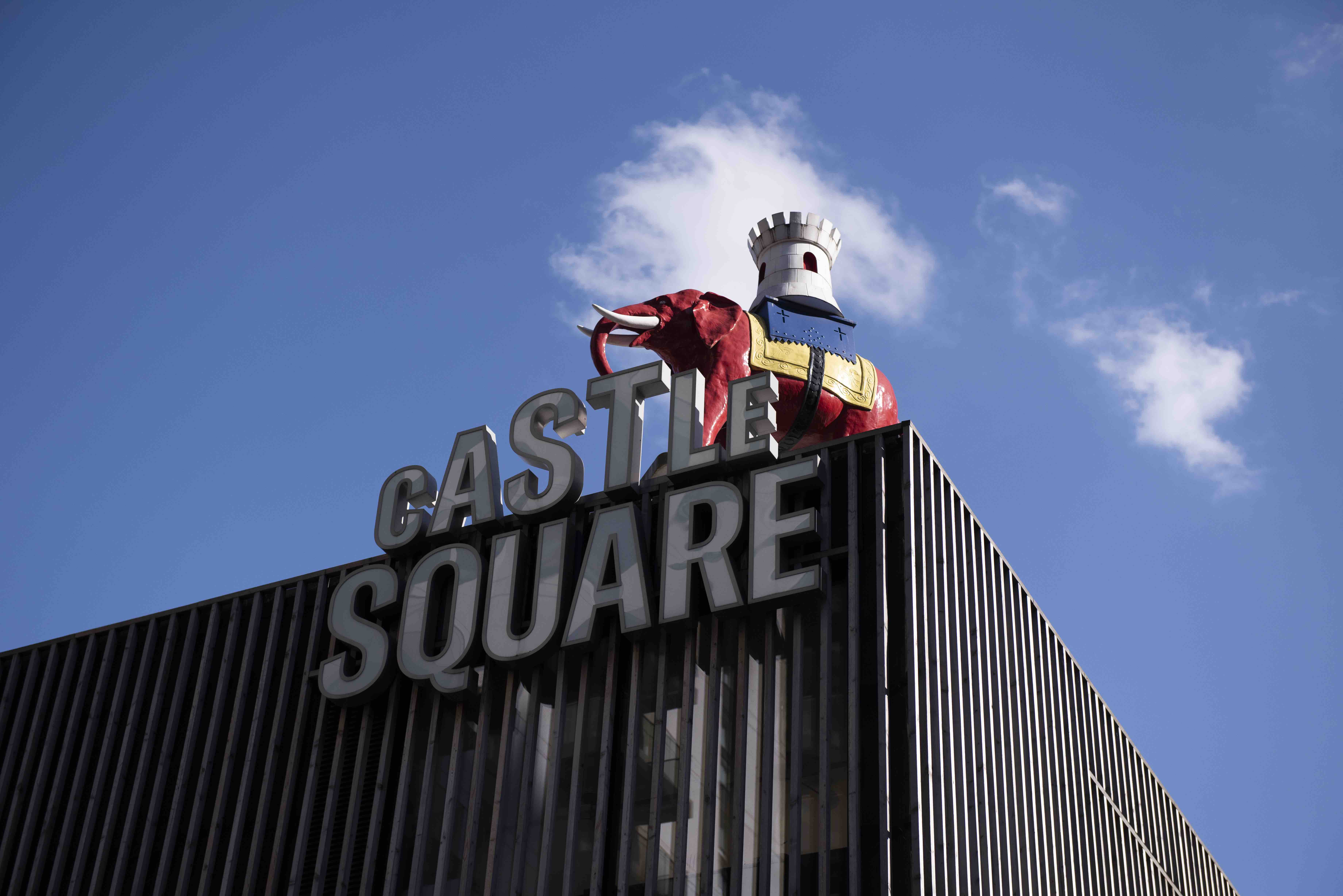
Amplifying voices and stories through art and culture
The arts represent a powerful voice for the diaspora, harnessing its creativity. In 2023, the award-winning play ‘My Uncle Is Not Pablo Escobar’ debuted at Brixton House. "It tackled stereotypes, invisibility and underrepresentation of the Latin American community,” claims producer Cecilia Alfonso-Eaton. Another interactive and comedic show, ‘Playing Latinx,’ challenged audiences' notion of the migrant experience. It's Colombian director Mariana Milena set up her own theatre company Theatre Mariana to “amplify Latin American voices and tell our own stories.”
Maria Cuervo moved from Bogotá to London in 2018 and worked as a producer at prestigious venues such as The Old Vic. Her most recent production ‘Super Chefs’, tells the story of young Mani, whose mum is Colombian and dad is Mexican, "a London family," she says. "It shows how being here as Latin Americans shapes us, and also how we shape back.”
While Karol G's visit was a treat for the diaspora, London's own Colombian music scene continues to soar. On a sunny Saturday in Brockwell park, artist R Louis demands, "¿Dónde está mi gente de Colombia?" to a packed out stage. Colombian pride is in the air with the tricolour flag taking its place up high as people of all ages and backgrounds enjoy the Latin rhythms at Lambeth Country Show.
On the Sunday, Londoners were treated to a day of salsa bands, with spectacular shows from salsa caleña. “I was blown away by the vibes," said one attendee, Rafe Offer, who happens to be CEO Sofar Sounds "SO fun - the music, the people, the energy and dancing! Far and away the best thing at the entire festival.” Colombian culture is slowly becoming part of the wider cultural dialogue in the UK," says Sophie Castillo, one of the new artists creating a buzz in the UK music media. “a lot of British people I know love Colombian food, they love our culture, and I think it’s something that we can share nicely here”.
The UK has long been under the spell of Colombian dance through companies like Cali Swing, Los Rumberos bringing their amazing Cali style dancers to festival stages and regular classes throughout the country. Sanura Dance, a queer dance company offers salsa and bachata in an inclusive environment, bringing together the Latin and queer community in one. Meanwhile, the Afro-Colombian bullerengue tradition is being alive and kicking in the UK, through groups such as Akolá Tambó and Esteben Card's Bullerengue Circles. Another folk group, Talentos, is bringing Colombian folk all over the UK.
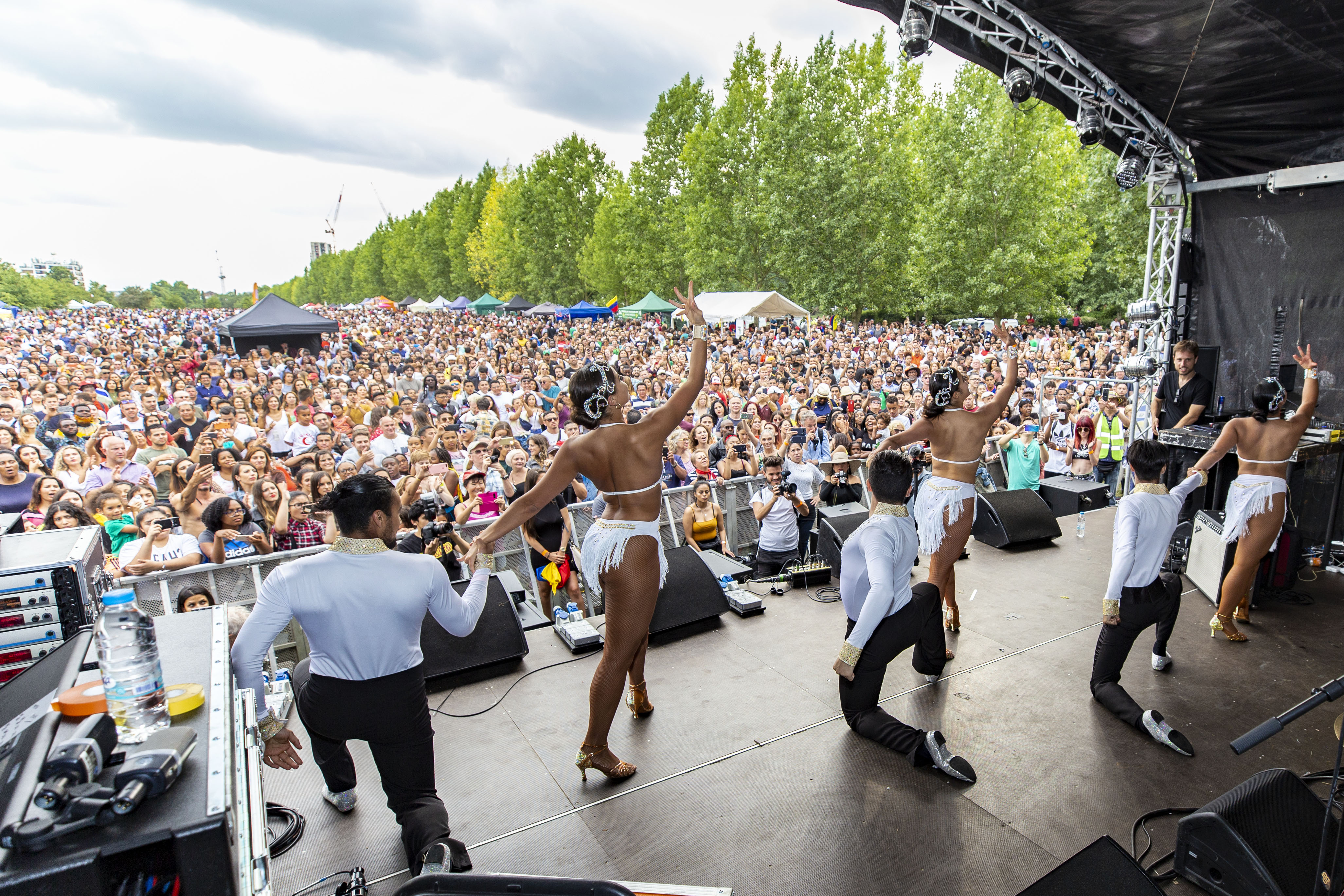
Between the urban movement, the energetic salsa scene, passion-fuelled folkloric performances, there is a rich offering of Latin musical traditions in the UK, and a large part of this is thanks to the Colombian diaspora, many of whom are now influencing the UK and international mainstream. The music of award-winning producer Dukus, who has brought his Colombian touch to the likes of Craig David, Ed Sheeran, Central Cee, Fredo, Knucks, Giggs and Stormzy, Wiz Kid can be found of various Netflix series.
Last year, Desta French (pictured on tube above by Aron Klein) was the first British Colombian artist to take her Colombian-infused UK genre on a US tour, culminating at the SXSW festival to great acclaim. And another rising star, Sophie Castillo, just opened for international superstar J Balvin, proudly announcing in London-spanglish to the entire 02 arena, ““I am a British Latina. Soy Colombiana, soy Cubana, pero nací aquí en Londres y crecí aquí en Londres. I’m so happy to be here representing UK Latinos.”
Cathy McIlwaine laments that while UK Society is already infused with Colombian flavours, the country's institutions are still very much behind and keeping “Latin Americans under the radar.” So far five London boroughs officially acknowledge ‘Latin American’ and King’s College London is the university in the UK to recognise this ethnic category.
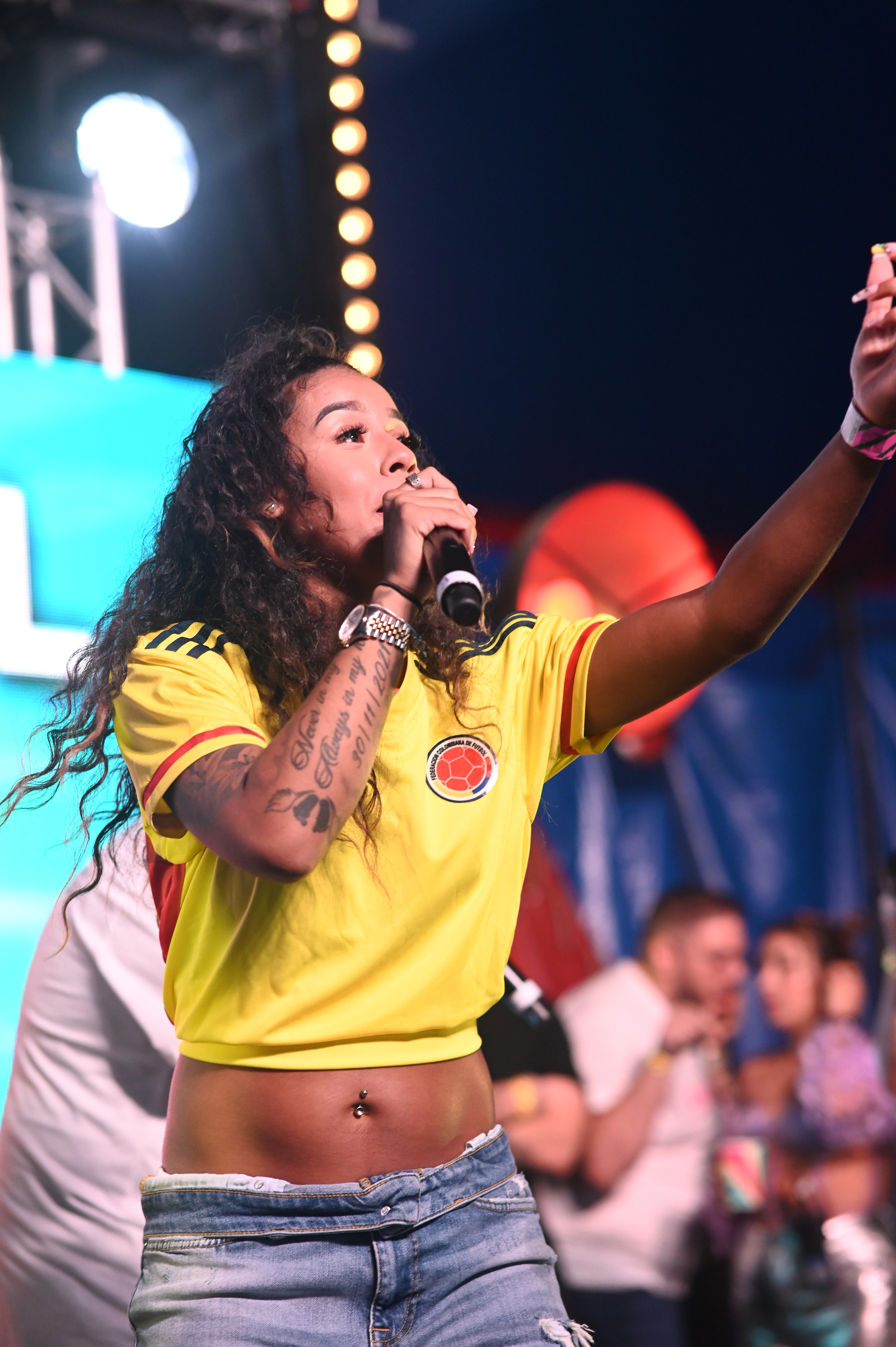
But Colombian pride, innovative attitude, resourcefulness and the resilience of the Colombian community in London shines through. “we thrive in difficulty”. says Maria Cuervo referring to the history of Colombia. "It is a “life skill which we finds ourselves tapping into everyday here in London."
From liberation of Spanish rule to battling present-day challenges, Colombian Independence Day celebrates the strength of the Colombian people. So at LatinoLife in the Park, on this special day in 2024, let’s raise a shot of aguardiente to the Colombians who paved the way back in the 70s for this thriving community which continues to flourish as the younger generations hold their roots close and fight for the future.


